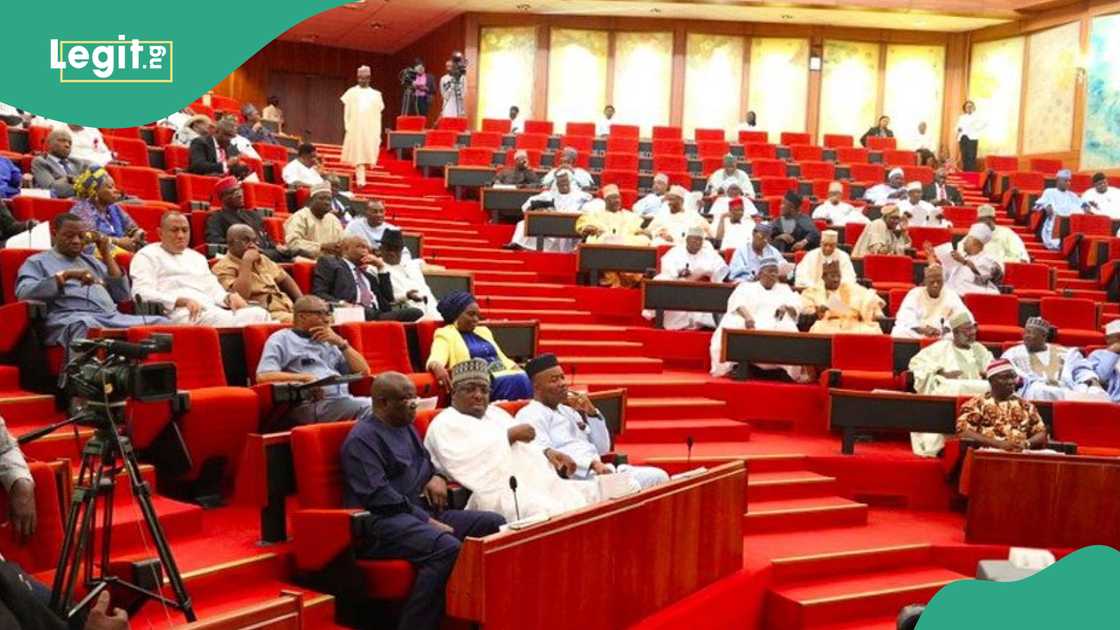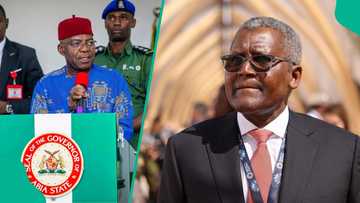Revoking Passport: Senate Approves Tough Penalty for Nigerians Jailed Abroad
- Nigeria’s Senate has advanced a bill targeting citizens convicted of crimes abroad, proposing a 10-year passport ban
- Lawmakers say the measure will help restore the global reputation of the Nigerian passport and deter criminal conduct overseas
- The bill, sponsored by Senator Abubakar Bello, aims to signal Nigeria’s commitment to accountability and international respect
The Senate on Tuesday advanced a bill that proposes the withdrawal of international passports from Nigerians convicted of crimes abroad for a minimum of ten years.
The bill, sponsored by Senator Abubakar Bello of Niger North, seeks to amend the Passport (Miscellaneous Provisions) Act.

Source: Getty Images
It introduces stringent penalties intended to deter criminal conduct by Nigerians overseas and rehabilitate the image of the Nigerian passport, which lawmakers say has suffered considerable reputational damage.
Senator Onawo Ogwoshi, who led the debate on behalf of the sponsor, described the bill as both “imperative and compelling.” He emphasised that the legislation would serve as a robust deterrent to individuals whose actions abroad have negatively impacted Nigeria’s international standing.
“Innocent and patriotic Nigerians suffer harassment in airports, visa denials and constant suspicion simply because of the actions of a few," Ogwoshi lamented.
Lawmakers push for accountability
Lawmakers argued that the measure would not only punish offenders but also send a clear message to the international community that Nigeria is committed to accountability and reform.
The bill has sparked discussions within diplomatic and civil society circles, with proponents asserting that it could help reverse the stigma attached to Nigerian travellers and restore confidence in the country’s identification documents.
As the legislative process continues, observers await further deliberations and potential amendments that could shape the final version of the bill.
Mohammed Ogoshi Onawo, often referred to as Senator Onawo Ogwoshi, is a member of the People’s Democratic Party (PDP). He previously served as Speaker of the Nasarawa State House of Assembly from 2003 to 2007 and was a member of the House of Representatives between 2011 and 2019, representing Awe/Doma/Keana Federal Constituency.
In the 2023 general elections, he achieved a major political upset by defeating former governor Tanko Al-Makura to win the Nasarawa South Senatorial seat.

Source: UGC
What is Senate?
The Nigerian Senate is the upper chamber of the National Assembly, responsible for lawmaking, oversight, and representation at the federal level.
Comprising 109 members, three from each of the 36 states and one from the Federal Capital Territory, it plays a pivotal role in shaping national policy. Senators serve four-year terms and are elected through popular vote.
The Senate reviews and approves bills, confirms presidential appointments, and conducts investigations into matters of public interest. It operates alongside the House of Representatives, forming Nigeria’s bicameral legislature.
The Senate is led by the Senate President, who presides over sessions and ensures legislative order.
Tinubu rejects 2 bills passed By senate
Legit.ng earlier reported that President Bola Tinubu has rejected signing two bills that were passed by the National Assembly into law. This was disclosed in the president's letter to the National Assembly, which was addressed to Senate President Godswill Akpabio.
In the letter, Tinubu noted that he could not assent to the bills because of inconsistencies and fundamental defects with existing financial and constitutional provisions.
In the letter, which was dated July 30, 2025, Tinubu explained his decision not to sign the Nigerian Institute of Transport Technology (Establishment) Bill, 2025, into law.
Proofreading by James Ojo, copy editor at Legit.ng.
Source: Legit.ng




